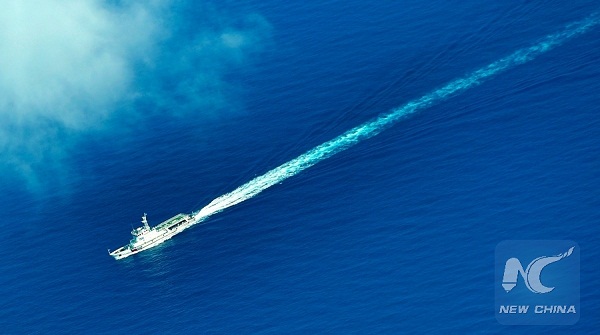
An aerial photo taken on Sept. 25, 2015 from a seaplane of Hainan Maritime Safety Administration shows cruise vessel Haixun 1103 heading to the Yacheng 13-1 drilling rig during a patrol insouth China Sea. (Photo:Xinhua/Zhao Yingquan)
The South China Sea arbitration unilaterally initiated by the Philippines will set a "serious, wrong, and bad example" if it is allowed to go through, Chinese Ambassador to Britain Liu Xiaoming said.
In a recent interview with Reuters, Liu said China will not participate in the arbitration and China believes it is illegal for a tribunal to handle this case.
"The Philippines' arbitration case is against UNCLOS (the United Nations Convention on the Law of the Sea), because sovereignty and territorial disputes are not under the jurisdiction of UNCLOS," Liu stressed.
Liu noted that China, like 30 other countries, made a declaration in 2006 that it will not take part in third party arbitration when it comes to maritime delimitation.
"UK is one of the 30 countries. UNCLOS provides that sovereign countries have their sovereign right to make these declarations on optional exceptions," he explained.
China has always called for bilateral consultation and negotiations with neighboring countries, including the Philippines, when it comes to maritime disputes, the Chinese envoy said.
There had been a series of statements between China and the Philippines on how to resolve disputes before 2013 when the Philippines submitted its arbitration case.
"In our view, the Philippines have turned their back on their promise and that is against international practice. Once agreed, you have to follow your commitment," he said in the interview.
According to UNCLOS, Liu said, arbitration is only a supplementary means to resolve disputes, and bilateral channels are regarded as the main means to resolve a dispute between countries.
"The Philippines had never come to China to talk about this arbitration. And China and the Philippines had never had serious negotiations on this subject back then," he elaborated.
UNCLOS provides that a compulsory arbitration will not be resorted to settle a dispute between countries unless all bilateral channels are exhausted.
If this arbitration goes through, it "is against the spirit of UNCLOS," and will "set a serious, wrong and bad example," said Liu, adding that British and Dutch experts on the Law of the Sea shared the same concern with Chinese legal experts.
"Some people try to label China as not respecting international law if we reject this arbitration. But that is totally wrong. What China is doing is exactly safeguarding the authority and seriousness of international law, safeguarding the letter and spirit of UNCLOS," he told Reuters.
No matter what decision this tribunal is going to make, "it has no impact on China and China's sovereignty over these islands and reefs will not be bound by it," Liu argued.
"We will not fight in the court, but we will certainly fight for our sovereignty," he stressed.
Citing China's record in resolving territorial disputes with its neighbors, Liu reiterated that the door remains open for the Philippines to return to bilateral negotiations with China.
"The Philippines, they can put forward their proposals. And we can have our proposals and we'll meet half way. Any negotiation is a process of compromise."
"Now they have elected a new government. We do hope that they will change their course, return to the negotiation table," said the diplomat.
In the interview, Liu also slammed the U.S. "rebalancing in the Asia Pacific," voicing suspicion over American motives.
"I think the American move in the Asia Pacific emboldened those countries to change the traditional channel of negotiation with China," making them believe in "a better deal with China" via U.S. help, he said.
Describing U.S. "freedom of navigation" claims as a false argument, the ambassador said the situation in the South China Sea is calm and peaceful with no reason for military involvement from an outside power at all.
"What they are doing is not for safeguarding free navigation," Liu said. "They are there to challenge China's sovereignty over the islands and reefs. And they make a dangerous provocation. China has a legitimate right to check what they are doing."


















































